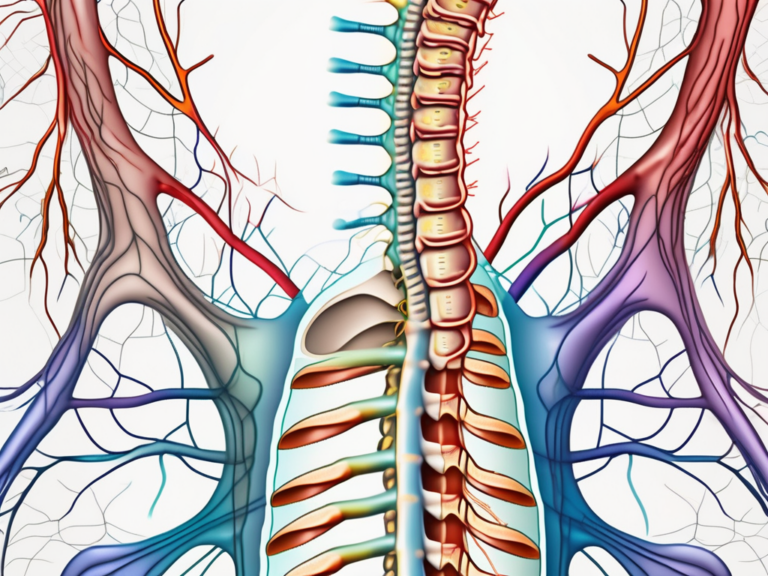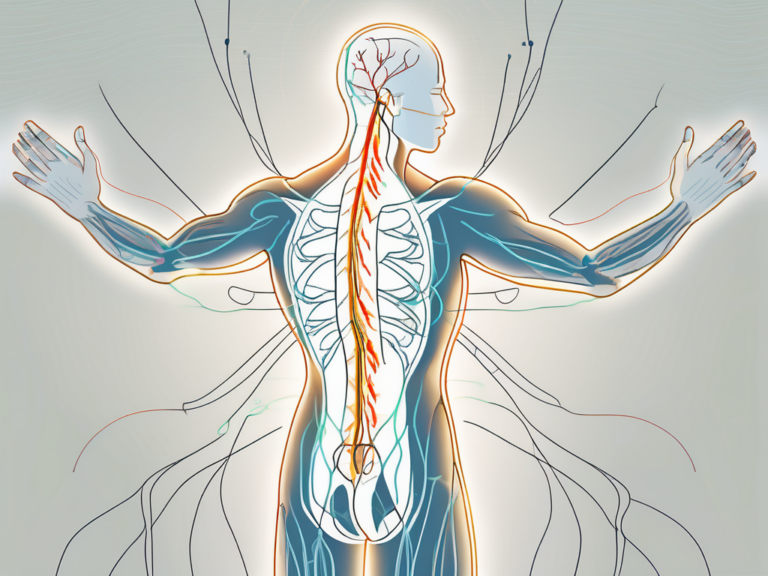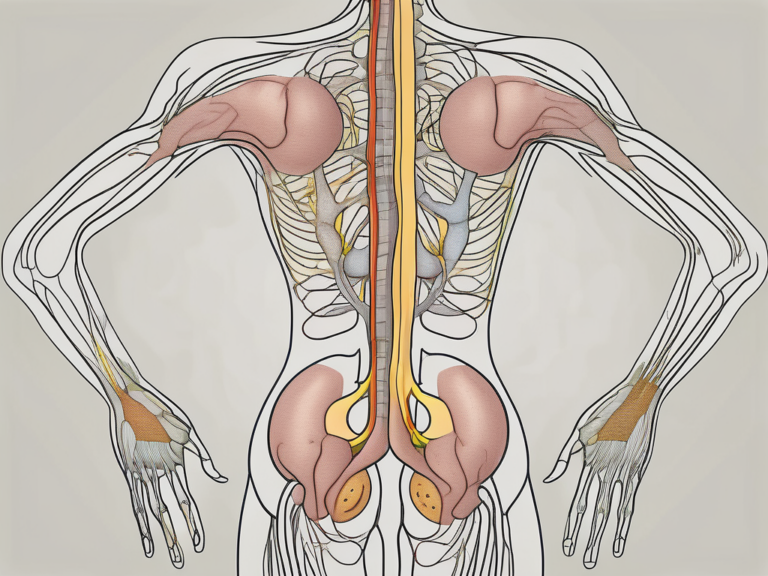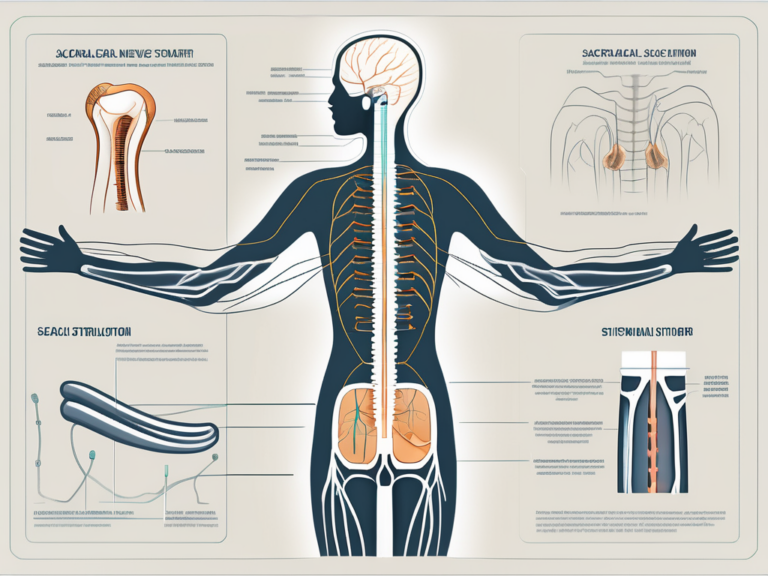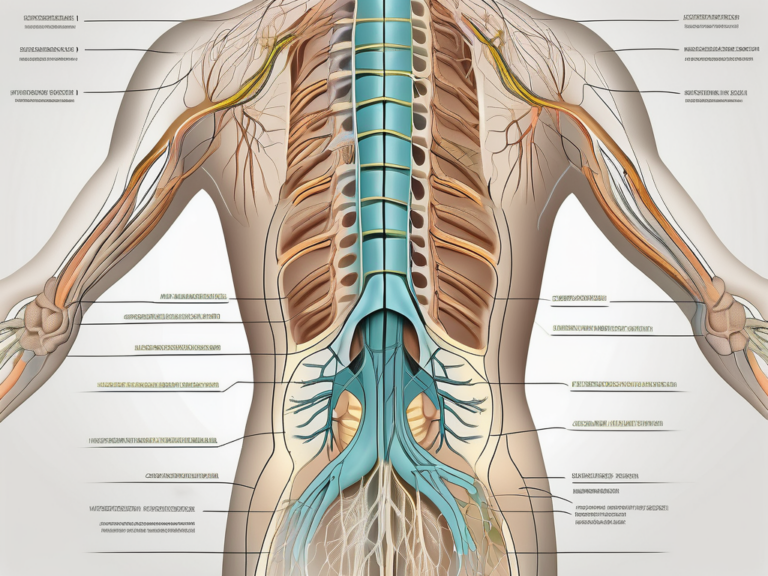What Does the Sacral Nerve Do in the Gut?
The sacral nerve plays a crucial role in the functioning of the gut. Understanding its anatomy, function, and impact on gut health is important for maintaining overall well-being. In this article, we will delve into the intricacies of the sacral nerve and explore its relationship with the gut.
Understanding the Sacral Nerve
The sacral nerve is a complex network of nerves that originates from the spinal cord. It is part of the autonomic nervous system, which controls involuntary bodily functions. The sacral nerve consists of multiple branches that extend from the lower back and sacrum, connecting to various organs, including the gut.
The sacral nerve is a fascinating component of the human body’s intricate nervous system. It plays a vital role in ensuring the proper functioning of the gut and digestive processes. Let’s delve deeper into the anatomy and functions of the sacral nerve.
Anatomy of the Sacral Nerve
The sacral nerve originates from the spinal cord, specifically the sacral region. It is formed by a collection of nerve roots that emerge from the spinal cord’s lower segments. These nerve roots join together to form the sacral plexus, a complex network of nerves that branches out to various parts of the body.
As the sacral nerve branches extend from the lower back and sacrum, they innervate different organs and tissues. Some of the major branches include the pelvic splanchnic nerves, which supply the pelvic organs, and the pudendal nerve, responsible for innervating the external genitalia and perineum.
The Role of the Sacral Nerve in the Nervous System
Within the nervous system, the sacral nerve plays a crucial role in regulating the gut’s activities. Its primary function is to transmit signals between the brain and the gut, facilitating communication and coordinating digestive processes.
Imagine the sacral nerve as a messenger, relaying important instructions from the brain to the gut and vice versa. This communication is essential for maintaining a harmonious balance within the digestive system.
By controlling the movement of muscles within the gut, the sacral nerve helps propel food through the digestive tract. It coordinates the rhythmic contractions known as peristalsis, ensuring the efficient movement of food from the esophagus to the stomach, small intestine, and large intestine.
In addition to its role in muscle movement, the sacral nerve also influences the secretion of digestive enzymes and hormones. These chemical messengers are vital for breaking down food, absorbing nutrients, and regulating various digestive processes.
Furthermore, the sacral nerve is involved in sensory functions, providing feedback to the brain about the gut’s condition. It relays information about pain, fullness, and other sensations, allowing us to perceive and respond to our body’s needs.
Overall, the sacral nerve’s intricate network and multifaceted functions highlight its significance in maintaining a healthy and efficient digestive system. Its coordination of muscle movement, regulation of secretions, and sensory feedback contribute to the overall well-being of our gut.
The Sacral Nerve and the Gut
How the Sacral Nerve Communicates with the Gut
The communication between the sacral nerve and the gut is a complex interplay of electrical signals and chemical messengers. When food enters the digestive system, sensory fibers within the gut detect its presence and send signals through the sacral nerve to the brain. In turn, the brain sends back signals to regulate the gut’s response, such as initiating peristalsis, the rhythmic muscle contractions that propel food forward.
This bidirectional communication ensures smooth digestion, nutrient absorption, and waste elimination.
The sacral nerve is part of the autonomic nervous system, which controls involuntary bodily functions. It originates from the sacral region of the spinal cord and branches out to innervate various organs in the pelvic region, including the bladder, reproductive organs, and the lower gastrointestinal tract.
Within the gut, the sacral nerve plays a crucial role in coordinating the movement of food through the digestive system. It receives sensory input from specialized cells called mechanoreceptors and chemoreceptors, which detect the stretching of the gut wall and the presence of specific chemicals, respectively.
These sensory signals are then transmitted to the brain via the sacral nerve, where they are processed and integrated with other sensory information. The brain, in turn, sends signals back to the gut through the sacral nerve to modulate its activity and ensure efficient digestion.
The Impact of the Sacral Nerve on Gut Function
A well-functioning sacral nerve is essential for maintaining optimal gut health. When the sacral nerve is compromised or experiences dysfunction, it can lead to various digestive disorders, such as constipation or diarrhea.
Disorders such as irritable bowel syndrome (IBS) and fecal incontinence can also be linked to sacral nerve issues. These conditions can significantly impact an individual’s quality of life and require medical attention for proper diagnosis and treatment.
Furthermore, the sacral nerve’s role in regulating the gut extends beyond digestion. It also plays a role in controlling the sensation of fullness and satiety, influencing appetite and food intake. Dysfunction of the sacral nerve can disrupt these processes, leading to abnormal eating behaviors and potentially contributing to weight management issues.
Research has shown that the sacral nerve can be targeted for therapeutic interventions in certain cases. For example, sacral nerve stimulation, a procedure that involves implanting a device to deliver electrical impulses to the sacral nerve, has been used to treat chronic constipation and fecal incontinence with promising results.
If you experience persistent gastrointestinal symptoms, it is crucial to consult with a healthcare professional to determine if the sacral nerve is involved. They can perform a thorough evaluation and recommend appropriate diagnostic tests or treatments to address any underlying issues.
Disorders Related to the Sacral Nerve in the Gut
The sacral nerve plays a crucial role in the functioning of the gut. When this nerve is affected by certain disorders, it can lead to a variety of symptoms and complications. Understanding these disorders and their impact on the body is essential for proper diagnosis and treatment.
Symptoms of Sacral Nerve Disorders
Symptoms of sacral nerve disorders can vary depending on the specific condition and individual factors. However, common symptoms may include changes in bowel habits, such as increased frequency or difficulty passing stools. These changes can significantly impact a person’s quality of life and daily activities.
In addition to bowel habit changes, individuals with sacral nerve disorders may experience abdominal pain, bloating, and loss of bowel control. These symptoms can be distressing and may require medical intervention to manage effectively. It is important to note that each person’s experience with sacral nerve disorders may differ, and symptoms can range from mild to severe.
If you experience any of these symptoms, it is recommended to seek medical advice for proper evaluation and diagnosis. A healthcare professional specializing in gastrointestinal disorders can conduct a comprehensive assessment to determine the underlying cause of your symptoms.
Diagnosis and Treatment of Sacral Nerve Disorders
Diagnosing sacral nerve disorders requires a thorough medical evaluation and diagnostic tests. Healthcare professionals will typically begin by reviewing your medical history and conducting a physical examination. This initial assessment helps them gather essential information about your symptoms and overall health.
In some cases, additional diagnostic tests may be necessary to confirm the presence of a sacral nerve disorder and identify any underlying causes. These tests may include imaging studies, such as magnetic resonance imaging (MRI) or computed tomography (CT) scans, to visualize the nerves and surrounding structures. Specialized procedures, such as anorectal manometry or nerve conduction studies, may also be performed to assess the functionality of the sacral nerve.
Once a diagnosis is established, treatment options for sacral nerve disorders can be explored. The choice of treatment depends on various factors, including the specific condition, its severity, and individual needs. In some cases, lifestyle modifications and dietary changes may be sufficient to manage symptoms and improve gut function. These changes may include increasing fiber intake, staying hydrated, and engaging in regular physical activity.
However, for more severe cases or when conservative measures fail to provide relief, medication or surgical interventions may be considered. Medications can help alleviate symptoms and regulate bowel movements. Surgical interventions, such as sacral nerve stimulation or nerve repair, may be recommended to restore normal nerve function and improve gut motility.
It is crucial to consult with a healthcare professional who specializes in gastrointestinal disorders to determine the appropriate course of action for your specific condition. They can provide personalized guidance and develop a comprehensive treatment plan tailored to your needs.
The Sacral Nerve and Gut Health
The sacral nerve, also known as the second sacral nerve or S2, is a crucial component of the autonomic nervous system. It originates from the sacral plexus, a network of nerves located in the lower back, and plays a significant role in regulating various functions of the gastrointestinal tract.
One of the primary functions of the sacral nerve is to control the muscles responsible for bowel movements. It sends signals to the colon and rectum, coordinating their contractions and relaxing the muscles of the anal sphincter to allow for the passage of stool.
Maintaining a Healthy Sacral Nerve
Several lifestyle practices can help promote a healthy sacral nerve and maintain optimal gut health. Adequate hydration is essential as it helps to soften the stool and prevent constipation. Drinking enough water throughout the day ensures that the digestive system functions smoothly, allowing the sacral nerve to carry out its role effectively.
Regular exercise is another key factor in maintaining a healthy sacral nerve. Physical activity stimulates the muscles in the gastrointestinal tract, promoting regular bowel movements. Whether it’s a brisk walk, jogging, or yoga, incorporating exercise into your daily routine can have a positive impact on your gut health.
A balanced diet rich in fiber is also crucial for a healthy sacral nerve. Fiber adds bulk to the stool, making it easier to pass through the digestive system. Foods such as fruits, vegetables, whole grains, and legumes are excellent sources of fiber and should be included in your daily meals.
Stress management techniques can also positively impact gut health by maintaining a healthy sacral nerve. Chronic stress can disrupt the normal functioning of the gastrointestinal tract, leading to digestive issues. Practicing relaxation techniques such as meditation, deep breathing exercises, or engaging in hobbies can help reduce stress levels and support a healthy sacral nerve.
Additionally, avoiding excessive alcohol consumption and quitting smoking can contribute to a healthy sacral nerve and overall well-being. Alcohol and tobacco can irritate the gastrointestinal tract, leading to inflammation and damage to the nerves, including the sacral nerve.
The Sacral Nerve’s Influence on Overall Gut Health
Considering the crucial role the sacral nerve plays in gut function, any disruption in its normal functioning can impact overall gut health. A compromised sacral nerve can lead to various digestive issues, such as constipation, diarrhea, or incontinence.
Furthermore, research suggests that an unhealthy sacral nerve may contribute to the development of more severe gastrointestinal disorders, including irritable bowel syndrome (IBS) and inflammatory bowel disease (IBD). These conditions can cause chronic pain, inflammation, and significant impairment in daily life.
Thus, it is vital to prioritize and maintain a healthy sacral nerve to support optimal gut health and overall well-being. By adopting healthy lifestyle practices, such as staying hydrated, exercising regularly, following a balanced diet, managing stress, and avoiding harmful habits, you can help ensure the proper functioning of the sacral nerve and promote a healthy gut.
Future Research on the Sacral Nerve and the Gut
Potential Developments in Sacral Nerve Research
Ongoing research on the sacral nerve and its association with gut health is providing valuable insights into potential treatments and interventions. Scientists are exploring innovative techniques, such as biofeedback therapy and neuromodulation, to improve sacral nerve function and alleviate gut-related symptoms.
One area of potential development in sacral nerve research is the use of advanced imaging techniques to visualize the nerve’s structure and function in real-time. This could provide researchers with a better understanding of how the sacral nerve interacts with the gut and help identify any abnormalities or dysfunctions.
Furthermore, researchers are investigating the role of the sacral nerve in regulating the gut microbiome. The gut microbiome, a complex ecosystem of microorganisms that reside in the digestive tract, plays a crucial role in maintaining gut health. By studying the interaction between the sacral nerve and the gut microbiome, scientists hope to uncover new therapeutic targets for gut-related disorders.
As our understanding of the sacral nerve continues to expand, we can expect further advancements in diagnostic tools and therapeutic approaches tailored to individual needs. Personalized medicine, which takes into account an individual’s unique genetic makeup, lifestyle factors, and gut microbiome composition, may become a reality in the near future.
The Future of Gut Health and the Sacral Nerve
The future of gut health intertwines with the evolving field of sacral nerve research. Understanding the intricate connection between the sacral nerve and the gut can pave the way for more targeted and effective treatments for individuals with digestive disorders.
One potential future development is the use of neurostimulation techniques to modulate the activity of the sacral nerve and restore gut function. This approach involves delivering electrical impulses to the sacral nerve, either through implanted devices or non-invasive methods, to regulate gut motility and reduce symptoms such as constipation or diarrhea.
Another exciting avenue of research is the exploration of the gut-brain axis and its relationship with the sacral nerve. The gut-brain axis refers to the bidirectional communication between the gut and the brain, which influences various aspects of health, including mood, cognition, and gut function. By understanding how the sacral nerve interacts with the gut-brain axis, researchers may uncover new strategies for managing gut-related disorders, such as irritable bowel syndrome or inflammatory bowel disease.
As we unlock the mysteries of the sacral nerve, we can look forward to improved quality of life and enhanced gut health for many individuals. However, it is important to note that further research is needed to fully understand the complexities of the sacral nerve-gut connection and develop safe and effective interventions.
In conclusion, the sacral nerve plays a significant role in the functioning of the gut. Its intricate connection with the digestive system impacts various aspects of gut health, including digestion, nutrient absorption, and waste elimination. Understanding the anatomy, function, and potential disorders associated with the sacral nerve can aid in maintaining optimal gut health. If you are experiencing persistent gastrointestinal symptoms, consult with a healthcare professional for accurate diagnosis and appropriate treatment options.

